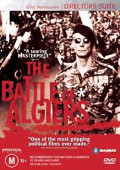
Directed by
Gillo Pontecorvo
135 minutes
Rated M
Reviewed by
Bernard Hemingway

The Battle Of Algiers
Synopsis: On October 7, 1957 the last surviving leader of the Algerian National Liberation Front was killed by French paratroopers. We look at the 3 years of armed struggle against the French colonialists that led up to this event and, briefly, its aftermath which culminated in Algeria's independence in 1962.Although strictly speaking not a documentary but a fact-based re-telling of historical events, the film's neo-realist style is so effective that it is difficult to believe that archival footage does not constitute a substantial part of it. In part this is due to the fact that the film's producer, Saadi Yacef, had been one of the insurgents' leaders (he here plays the character Ali Kader) and had the full backing of the Algerian Government to make the film. Credit must, however, be given to the director (in addition to Pontecorvo, Yacef had also approached Francesco Rosi and Luchino Visconti, pioneers of Italian neo-realism, for the directorial mantle), who, with his co-screenwriter Franco Solinas, spent 12 months researching the film. The outcome is a striking mixture of meticulous recreation and dramatic essentialisation, occasionally, but only occasionally, seeming to be too drawn out and given great emotional resonance by a score written by Pontecorvo and Ennio Morricone. Only one major role, that of Colonel Mathieu, the commander of the French paratroopers, was played by a professional actor, Jean Martin, who is outstandingly effective as the coldly pragmatic professional soldier (the character was based on the real leader of the French forces, General Jacques Massu).
We are now, of course, a long way from 1960s counterculturism and the civil rights and anti-Vietnam war movements that constituted the original context for the screenings of this film. Inured as we are to mass media representations of war and injustice, in one sense the events depicted here are long since gone. But given the present situation in Iraq and Israel, the film is immediately relevant in giving us insight into the world of terrorism. The Battle Of Algiers is a paradigm of the violent struggle for self-determination between a smaller and a larger force in general, and for the Arab struggle in particular. In an uncanny way the Algerian experience was the inception of the kind of guerrilla tactics which are now reported to us daily from around the world..
Aside from the value the film has in placing contemporary events in a historical perspective it also has philosophical bite. It is not a simple Left espousal for the Arab underdog but lucidly explores the moral questions on both sides of the struggle. It is important to recognize that the Arab terrorists represented only a small percentage of the native population, the vast majority of whom were passively indifferent, and that they were prepared to intimidate and kill their own people as much or perhaps even more so, than the French (French sources estimated that 70,000 Muslim civilians were killed or presumed killed by the FLN out of a total 350,000 dead). It is of interest that the desired independence did come about as the result of a popular uprising some 5 years after the main concern of Pontecorvo's film. Unfortunately we are not told in any useful way how this came to pass.
Whilst we are witnessing the renaissance of the polemical documentary, the epochal sweep and moral commitment of The Battle Of Algiers belongs to a different time and deserves to be seen by anyone interested in 'political' cinema.

Want more about this film?


Want something different?




